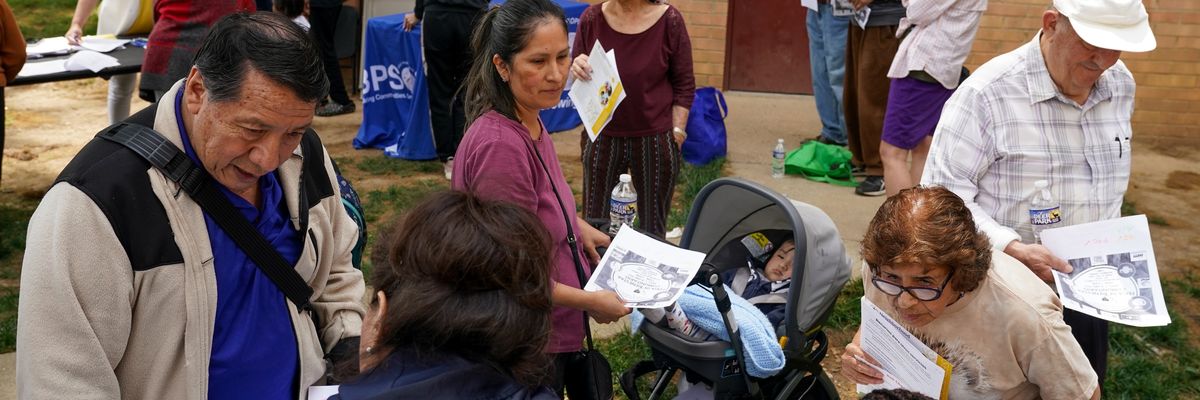With a green light from the federal government, states across the U.S. have thrown hundreds of thousands of low-income people off Medicaid in recent weeks—and many have lost coverage because they failed to navigate bureaucratic mazes, not because they were no longer eligible.
More than a dozen states, including Florida and other Republican-led states that have refused to expand Medicaid under the Affordable Care Act, have begun removing people from Medicaid as part of the "unwinding" of a pandemic-era federal policy that temporarily barred governments from kicking people off the program.
In a bipartisan deal late last year, Congress agreed to cut off the pandemic protections, giving states 12 months to redetermine who is eligible for the healthcare program that covers tens of millions of Americans.
The process differs in each state, but Medicaid enrollees are typically required to complete paperwork verifying their income, address, disability status, and other factors used to determine eligibility for the program.
While some states have undertaken public outreach campaigns to ensure Medicaid recipients understand what they need to do to continue receiving benefits, most enrollees across the country "were not aware that states are now permitted to resume disenrolling people from the Medicaid program," according to new survey data from the Kaiser Family Foundation (KFF).
As a result, The New York Timesreported Friday, "many people lost coverage for procedural reasons, such as when Medicaid recipients did not return paperwork to verify their eligibility or could not be located."
"The large number of terminations on procedural grounds suggests that many people may be losing their coverage even though they are still qualified for it," the newspaper added. "Many of those who have been dropped have been children."
Early data released by the state of Florida, for example, shows that more than 205,000 people in the state lost coverage for procedural reasons after April eligibility checks.
"We knew this was coming. But we still treat these burdens like they're unavoidable natural disasters," said Pamela Herd, a professor of public policy at Georgetown University. "We need to be much more explicit about these failures because we're making a choice to allow this."
Joan Alker, executive director of the Georgetown Center for Children and Families, said she is "very worried about Florida."
"We've heard the call center's overwhelmed, the notices are very confusing in Florida—they're very hard to understand," said Alker.
In a recent letter to Republican Gov. Ron DeSantis, a 2024 presidential candidate, more than 50 advocacy groups demanded a Medicaid redetermination pause, pointing to "reports of Floridians being disenrolled from Medicaid without having received notice" from the state's Department of Children and Families (DCF).
"One of these individuals is a 7-year-old boy in remission from Leukemia who is now unable to access follow-up—and potentially lifesaving—treatments," the groups wrote. "Families with children have been erroneously terminated, and parents are having trouble reaching the DCF call center for help with this process. Additionally, unclear notices and lack of information on how to appeal contribute to more confusion."
"We are deeply concerned about those with serious, acute, and chronic conditions who will continue to lose access to their lifesaving treatments during this time, along with people who risk substantial medical debt, or even bankruptcy, as a result of coverage loss," the groups added.
The Times highlighted the situation in Arkansas, which is led by Republican Gov. Sarah Huckabee Sanders—a supporter of Medicaid work requirements and other attacks on the program. (Work requirements were briefly tried in Arkansas in 2018 and 2019, with disastrous consequences.)
"In Arkansas, more than 1.1 million people—over a third of the state's residents—were on Medicaid at the end of March [2023]," the Times noted Friday. "In April, the first month that states could begin removing people from the program, about 73,000 people lost coverage, including about 27,000 children 17 and under."
An Arkansas law requires the state to complete its Medicaid eligibility reviews in six months instead of 12.
In a Wall Street Journalop-ed earlier this month, Sanders wrote that her state is booting people from Medicaid at "the fastest pace in the nation" and claimed those being removed are "ineligible participants"—ignoring evidence that many being stripped of coverage were technically still eligible.
The U.S. Health and Human Services Department has estimated that upwards of 15 million people nationwide could lose Medicaid coverage during the redetermination process.
"This is such an enormous policy failure—profoundly cruel and will contribute to furthering inequities," Dr. Cecília Tomori, a public health scholar at Johns Hopkins University, wrote Friday.
While some who lose Medicaid will be able to access insurance through an employer or the Affordable Care Act marketplaces, KFF found that more than four in ten people with Medicaid as their only source of healthcare "say they wouldn't know where to look for other coverage or would be uninsured" if they were removed from the program.
"This is about to happen to a lot of people," warned Larry Levitt, KFF's executive vice president for health policy.
The Times pointed to the case of 54-year-old Arizona resident Debra Miller, who "lost Medicaid coverage in April after her roughly $25,000 annual salary as a Burger King cook left her ineligible."
"Ms. Miller, a single mother with diabetes and hypothyroidism, worked with an insurance counselor at North Country HealthCare, a network of federally funded health clinics, to enroll in a marketplace plan with a roughly $70 monthly premium," the Times reported.
Miller told the newspaper that the new plan is a "struggle" both because of the new monthly payment and because it doesn't include the vision coverage she needs and now may not be able to afford.
The Congressional Budget Office estimated earlier this week that states' Medicaid eligibility checks will likely leave 6.2 million people without any insurance at all.



